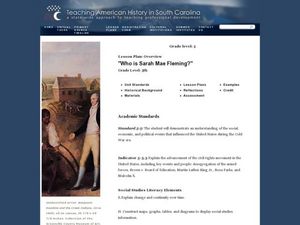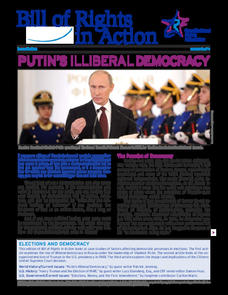Curated OER
What is Art?
Young scholars become familiar with the art and architecture and history of the Chicago World's Fair. In this public arts project lesson, students compare and contrast fine art and public art through a study of the exhibits at the...
Curated OER
Building a Human Rights Document
Young scholars identify the issue of basic human rights, examine the importance of the UDHR, and compare it to United States Bill of Rights. They create a definition of human rights as a class. Students are divided into groups of four...
Curated OER
Who Is Sarah Mae Fleming?
Fifth graders learn about two influential women. In this historical figures activity, 5th graders work in groups to read articles about Rosa Parks and Sarah Fleming and share their findings with the class. Students use a Venn Diagram...
Curated OER
Tiananmen Square
Students identify and explain the Tiananmen Square incident of June 1989.
Studentsl compare what it is to be an American Citizen (Democracy) vs.
Chinese Citizen (Communism). Students identify and define various vocabulary terms,...
Curated OER
Nonviolent Leaders
Students compare the life of Gandhi and other nonviolent leaders. They identify qualities and behaviors of nonviolence. They synthesize the information they research about world leaders and the impact they had.
Newseum
Making a Change: Letter From Birmingham Jail
Martin Luther King Jr.'s "Letter From Birmingham Jail" was written in response to "A Call for Unity," written by eight white ministers from Birmingham and published in the local newspaper. After reading both letters and following a list...
Curated OER
1864-1865: Bringing the War to an End
An interesting lesson plan explains the last battles of the war and the terms of the Articles of Surrender. It also analyzes the election of 1864 with copies of the Baltimore and Chicago platforms. To conclude the lesson, academics...
Curated OER
Post-1865: Effects of the War
An engaging lesson focuses on the impact of the war and Lincoln's plan for Reconstruction had on the United States. Historians analyze primary documents, such as Constitutional Amendments and newspaper experts. They also participate in...
Teaching Tolerance
Jim Crow as a Form of Racialized Social Control
Just because slavery was illegal doesn't mean it went away ... Jim Crow Laws took its place. An eye-opening lesson focuses on how Jim Crow Laws were used as a form of racial social control against African Americans in the United States....
Smithsonian Institution
Resistance to School Desegregation: The Boston Busing Crisis
Despite how it sounds, Boston's busing crisis wasn't a transportation problem. Academics address the problems faced by African Americans following school desegregation and the struggle to receive equal educational opportunities. Scholars...
Teaching Tolerance
Mass Incarceration as a Form of Racialized Social Control
Mass incarceration: A result of a tough stance on crime or racial discrimination, you decide. Academics explore the history and reasons behind mass incarcerations in the United States and its impact on ethnic communities. The...
DocsTeach
Analyzing a Letter from Jackie Robinson: "Fair Play and Justice"
Jackie Robinson was more than a baseball legend; he was an activist, too. An interesting resource explores Robinson's time in the military using primary sources. Scholars examine the racially inspired event that led to a court martial...
National Park Service
Discover the Mary Ann Shadd Cary House
Mary Ann Shadd Cary was an extraordinary woman, no matter the time period. Academics research the life and achievements of Mrs. Cary, who was born a free African American in 1823. The lesson uses primary sources, worksheets, written...
Smithsonian Institution
Separate is Not Equal: Fight for Desegregation
Separate is not equal! An eye-opening activity delves into the past to understand the fight for desegregation and how it impacted African American communities. Academics complete two one-hour lessons using documents, photographs, and...
Alabama Department of Archives and History
Montgomery Bus Boycott: We Would Rather Walk!
Have historians use primary sources to learn about the circumstances and implementation of the Montgomery Bus Boycott, and think about the issue of boycotts as a means of effecting social change. Wrap it up with a letter to the editor...
K12 Reader
Abraham Lincoln Bio Poem
Everyone knows about Abraham Lincoln as a historical figure, but what was he like as a person? Young historians complete a biopoem about Lincoln, including his character traits, his relationships, his fears, and his needs.
American Battlefield Trust
Emancipation 1861 to 1863
Academics read newspaper articles from 1861 to 1863 regarding Emancipation and answer questions to understand how public opinion changed over time and why. The activity provides scholars with good historical context and the vocabulary...
DocsTeach
"We Are Badly in Need of a Breath of Fresh Air": A Letter to President Kennedy About LGBTQ+ Rights
The 1960s were a pivotal time for many Americans who had long been discriminated against. Scholars read a document addressed to President Kennedy in support of LGBTQ+ rights and why they are essential. The activity includes group...
Center for History Education
Brown v. the Board of Education: Success or Failure?
Desegregation does not mean equality. An eye-opening lesson focuses on the impact of the Brown v. Board of Education decision to end school segregation. Scholars review a series of political cartoons to understand how the public viewed...
DiscoverE
Windy City Tower
Your class will be blown away when they build their own city tower structure! Engineering scholars partner up to plan, build, and test their own paper towers. As they build, they gain valuable design skills, learn about wind tunnel...
National Woman's History Museum
African American Activists
Ida B. Wells, Rosa Parks, and Fannie Lour Hammer are three African American activists who stood up for change. Though living in different time periods, all three women sought justice and equality. Class members examine primary source...
Facing History and Ourselves
Standing Up to Hatred on Cable Street
The final lessons in this section of the Standing Up for Democracy unit ask class members to consider ways they can help create a "more humane, fair, and compassionate environment" in their communities. For context, learners study how...
Constitutional Rights Foundation
Putin's Illiberal Democracy
Is Russia really a democracy? High school scholars explore Russian democracy under the leadership of President Putin. The resource provides opportunity for group discussion, writing, and research to understand Russia's political history,...
Roy Rosenzweig Center for History and New Media
The Revolutionary Times as Seen Through the Eyes of Women
The role of women before and during the American Revolution changed dramatically. To gain an understanding of these changes, middle schoolers analyze primary source documents, including letters from women that supported the patriot cause...

























